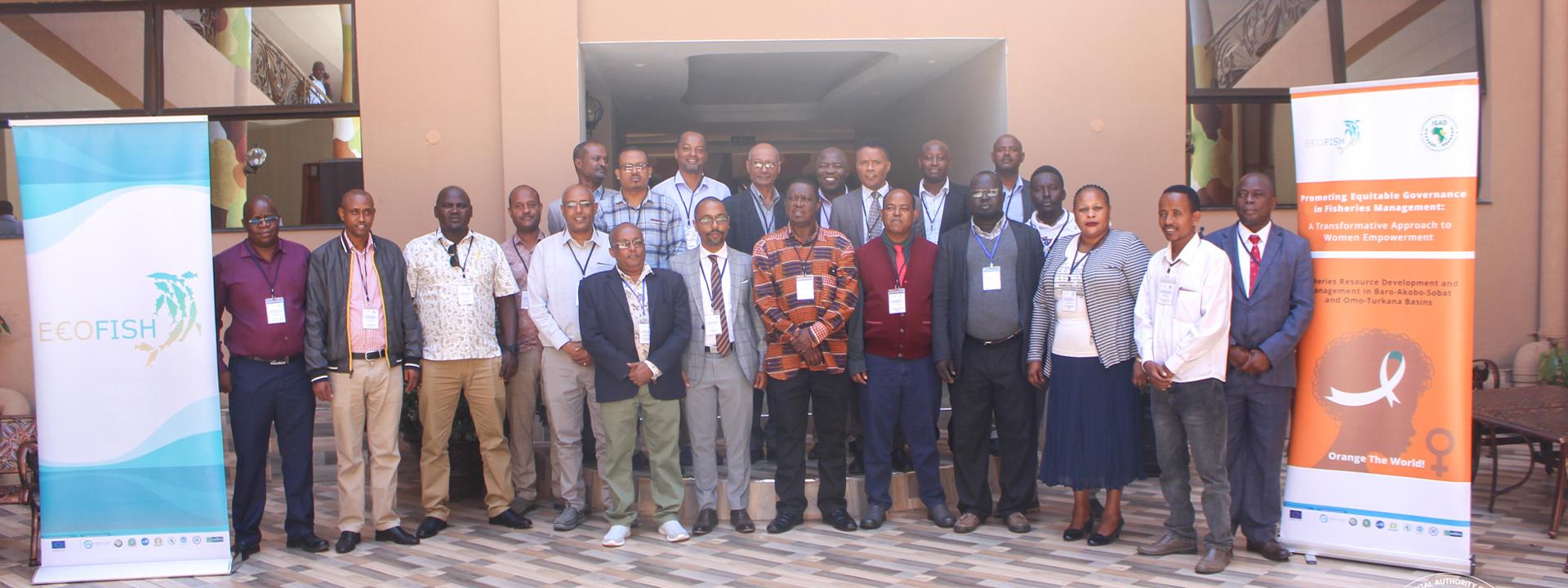October 19, 2022 (NAIVASHA, Kenya): The Intergovernmental Authority on Development (IGAD), in partnership with the European Union and within the framework of the Ecosfish Programme, organized a 3-day validation workshop on the Socioeconomic Situation and Capacity Need Assessment of fisheries in Omo-Lake Turkana Basin between Ethiopia and Kenya.
The workshop was attended by representatives of the Ministries of Foreign Affairs of Kenya and Ethiopia, the State Department of Fisheries, Aquaculture Development & Blue Economy of Kenya, County Governments of Turkana and Marsabit, Turkana University College, KAMFRI, Ministry of Agriculture of Ethiopia, Ministry of Water and Energy of Ethiopia, Jinka University of Ethiopia, , Addis Ababa University and Ethiopia Institute of Agricultural Research- National Fishery and Aquatic Life Research, Fisheries Experts from South Nations and Nationalities and People Region of Ethiopia.
In his opening speech and on Behalf of the IGAD Executive Secretary, Dr Eshete Dejen Programme Manager of IGAD AED-Sustainable Environment Unit and Ecofish Project Coordinator said “IGAD is the lowest fish consumer region in the world despite huge fisheries resources from inland and marine water. For example, the exploitation of the marine fish is only 5% with the vast majority of the resource remaining untapped. This reality has informed the development of a 5-year Blue Economy Strategy and now we have embarked on mobilizing resources to implement the strategy.
The Director of State Department of Fisheries, Aquaculture Development and Blue Economyof the Ministry of Agriculture, Livestock, Fisheries and Cooperatives of Kenya Dr Rodrick Kundu in his official opening remarks noted as follows: “The Omo-Lake Turkana Basin forms one of the platforms for collaboration between Kenya and Ethiopia, and the border separating the two countries is an artificial reality. 70% of fish production in Kenya comes from inland waters yet we also have a huge potential in the marine. This potential can only be unlocked by private sector investment into the industry. We also need to invest in research which is the only way to get relevant data and information necessary for managing and investing into the fisheries resources.”
The purpose of these workshops is to validate these draft documents by involving the Bilateral Fisheries Coordination Platform (BFCP) members from the three project implementation countries (Ethiopia, Kenya, and South Sudan). BFCP was established in each basin by the IGAD Ecofish Project. Ethiopia and Kenya came together to review the draft baseline report and update the gaps, if any. The key outcomes of the workshop include production of reviewed and revised study reports and validation of data/information from study documents by national experts.
Introduction
The E€OFISH Programme is a Cross-Regional Initiative funded by the 11th EDF to leverage regional cooperation for enhancing sustainable inland and marine fisheries in Eastern African, Southern Africa and the Indian Ocean (EA-SA-IO) region. The overall objective of the programme is “to enhance equitable economic growth by promoting sustainable fisheries in the EA-SA-IO region”. The specific objective is “to support sustainable management and development of fisheries in order to contribute to poverty alleviation, food and nutrition security while addressing climate change resilience and enhancing marine biodiversity”.

